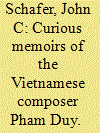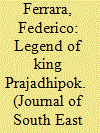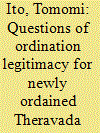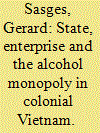|
|
|
Sort Order |
|
|
|
Items / Page
|
|
|
|
|
|
|
| Srl | Item |
| 1 |
ID:
113349


|
|
|
|
|
| Publication |
2012.
|
| Summary/Abstract |
This paper presents an overview of the main features and nature of T?t, the Vietnamese lunar New Year festival, as it is currently experienced in H? Chí Minh City. It outlines a variety of social practices associated with T?t and suggests that it is through these that one can identify a 'festive landscape' in the city, within which a number of diverse places are made into and experienced as 'meaningful space' in the context of the T?t festival. The emphasis is on how the spatial practices associated with the festival constitute the lived experience of T?t by urban residents and on how this both transforms and connects various sites. Of particular importance here is the family home and how it is linked to the wider holistic experience of T?t, bringing together in a single place sacred and secular, public and private, and the production and consumption of place, in a social construction that is characterised as a heterotopia.
|
|
|
|
|
|
|
|
|
|
|
|
|
|
|
|
| 2 |
ID:
113348


|
|
|
|
|
| Publication |
2012.
|
| Summary/Abstract |
This article reviews the memoirs of Ph?m Duy, a famous Vietnamese composer, who in the late 1930s and 1940s composed some of the first modern Vietnamese songs. His memoirs describe his time with the anti-French Resistance, his break with it in 1950, and his years in Saigon and the United States. My review focuses on curious aspects of these memoirs: Ph?m Duy's careful listing of his many love affairs; his insistence that he needed lovers to compose songs; and his failure to acknowledge that he profited from a culture that glorifies the self-sacrifice of women. After considering whether Ph?m Duy's behaviour as depicted in his memoirs conforms to cultural norms for Vietnamese male artists, I argue that it is best seen as, in Judith Butler's expression, a 'hyperbolic exhibition' of the natural. I conclude by speculating about how Ph?m Duy and his memoirs may be viewed in future years.
|
|
|
|
|
|
|
|
|
|
|
|
|
|
|
|
| 3 |
ID:
113351


|
|
|
|
|
| Publication |
2012.
|
| Summary/Abstract |
This article proposes to study nineteenth-century Cam sources as valuable materials for the history of the disappearance of the kingdom of Campa - or more precisely its last independent principality of Pa??ura?ga - and its integration into the Vietnamese realm during the first half of the nineteenth century. The end of Campa is recorded mainly in metrical works known as 'ariya'. These sources offer unique and detailed accounts of the incorporation of Campa as a Vietnamese province and the new administrative, economic, religious and cultural policies implemented by the Vietnamese. They also highlight the sufferings of the Campa population witnessing the imposition of a new and foreign order.
|
|
|
|
|
|
|
|
|
|
|
|
|
|
|
|
| 4 |
ID:
113345


|
|
|
|
|
| Publication |
2012.
|
| Summary/Abstract |
The figure of King Prajadhipok (r. 1925-35), Siam's last absolute monarch, remains of great significance to Thailand's contemporary political discourse. King Prajadhipok's historical role as the 'founding father' of Thai democracy, in particular, lies at the heart of the Chakri dynasty's claim to democratic legitimacy - a claim that is now widely questioned, both at home and abroad. This article re-examines King Prajadhipok's conduct in the early days of constitutional government in Siam. While the King's status as the father of Thai democracy is exposed as a myth, his actual historical legacy is shown to have been no less profound.
|
|
|
|
|
|
|
|
|
|
|
|
|
|
|
|
| 5 |
ID:
113346


|
|
|
|
|
| Publication |
2012.
|
| Summary/Abstract |
This article explores English-Thai translations of 'political ideology'. It traces the evolution of the Thai term udomkan and discusses how the complexity of the foreign discourse was reflected in its Thai counterpart. There was a conflation of 'idea' and 'ideal'. Udomkan is a uniquely Thai word, translations of which have never been stable. The contemporary political conflict is analysed through an attempt to catalogue the points on which opposing sides pivot. While this tangled 'pre-post-ideological' predicament is not unique to Thailand, it exemplifies the ways in which cross-country comparisons might be wary of coding political factions along universal standards of coherence, contrast or temporal stability.
|
|
|
|
|
|
|
|
|
|
|
|
|
|
|
|
| 6 |
ID:
113347


|
|
|
|
|
| Publication |
2012.
|
| Summary/Abstract |
In Thailand the widespread assumption that bhikkhuni ordination has already been disrupted and that as a result Theravada Buddhist women can no longer be ordained has been challenged by a group of women who have received the full monastic precepts from foreign sa?gha and practise Theravada Buddhism in yellow monastic robes. Public concerns have centred on whether such bhikkhuni ordinations are possible, and how women could become bhikkhuni in a 'correct' way. Both supporters and opponents are often vocal in discussing ordination ceremony procedures, based on their interpretation of the vinaya, the monastic disciplines. This paper argues that it is not a matter of 'right' procedure, but rather of the authority of the religious institution or tradition that validates one's ordination. Even if a woman is ordained as a bhikkhuni by the 'right' procedure, her status remains unstable unless the religious authority of her country sanctions her ordination. In other words, it is only a political decision made by a religious institution - in the case of Thailand, the National Sa?gha - that can reinstate 'legitimate' bhikkhuni ordination.
|
|
|
|
|
|
|
|
|
|
|
|
|
|
|
|
| 7 |
ID:
113350


|
|
|
|
|
| Publication |
2012.
|
| Summary/Abstract |
The state-administered monopoly on the production of distilled rice alcohol instituted in Vietnam after 1897 evolved into one of the colony's most pervasive and unpopular institutions. This article examines the origins and operations of the monopoly, focusing on how much revenue it generated and for whom. It reveals that the monopoly generated little net revenue for the state, and instead functioned to promote the creation of a centralised and ostensibly civilian administration, capable of intervening in the economy to promote the accumulation of capital by local French entrepreneurs, but ultimately dependent on vast, invasive and frequently brutal systems of surveillance and control.
|
|
|
|
|
|
|
|
|
|
|
|
|
|
|
|
|
|
|
|
|